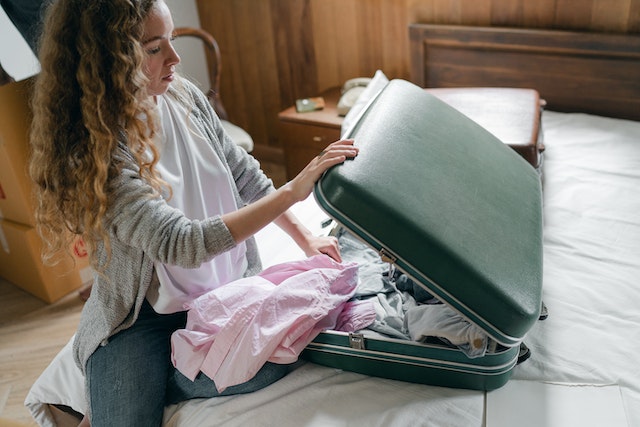Even if your adult children still reside in your house after you thought you would be alone, at least you have company. More than half of Americans between 18 and 24 (and nearly a third of those between 18 and 34) still live with their parents. And over the past 60 years, those numbers have been continuously rising. You’re not alone if you’re wondering how to help your adult child move out. The question that often arises is how to speed up the moving process.
These multigenerational setups are popular. They may be mutually advantageous both financially and practically. There is, however, occasionally an undesirable imbalance. What happens if you want your child to leave, but they’ve made a permanent home in your basement? How can you help? The majority of the suggestions made by therapists and financial experts include cooperative bargaining, realistic expectations, and a supported route toward your children being able to live independently.
6 Tips to Help Your Adult Child Move Out
Thank you for raising your child(ren) to adulthood! You’ve successfully navigated the challenge and now have a fully grown adult on your hands. Then why haven’t they left yet? Most Americans now have at least one adult friend who still lives with their parents. The fact that your children remained at home well into adulthood may have been influenced by unemployment (and its evil sibling, underemployment). Your adult children may have boomeranged or left home only to return because there may not have been enough cheap housing options in some locations. But occasionally, you—not them—are blamed for your kids’ failure to take off. Also, people are not aware why it’s harder to move house as you get older, so here are the 6 tips that can help your adult child move out.

Don’t go above and beyond for them
Adult children aren’t merely living with their parents anymore. The duties and curfews they experienced as children don’t apply to adult children. The parents prepare their meals and clean up after themselves. And, to put it politely, they permit their kids to have overnight visitors.
Don’t serve their every need. Why would anyone want to leave the house when their parents take care of everything, pay for everything, give them an allowance, and give them a car? They lack any motivation to live alone. Because of this, psychiatrists advise parents to avoid creating perfect lives for their adult children if they ever want them to move out. And even if you have the best of intentions, if you are the type of parent who has kept your kids dependent on you, it’s time for you to stop.
Do not simplify their lives
Children are staying, according to psychologists, because parents are making the environment too comfortable. Adult children may have been compelled to seek sanctuary in their parent’s homes due to circumstances such as health issues and marital issues. They haven’t established themselves for those reasons, though. Kids are receiving the privileges of adulthood from their parents but not the responsibilities.
Establish and follow house rules
Regarding your house rules, be tough. Alfred Poor, a full-time technology speaker and author, temporarily housed his adult kid. The idea is to respect (your children) as individuals and to expect respect in return, Poor added, explaining why it worked out nicely. It’s your home, your rules. And if they want to live together in that house, they must chip in.
In Poor’s instance, the responsible adult upheld their end of the bargain by preparing meals and doing the laundry.
Charge them for the rent and promise a refund
Start by establishing standards. Some professionals advise collecting rent up front and then raising it after six months. There should be an agreement among all parties. Everyone is aware of the plan’s details and its progressive phases. Write it down on a calendar or other timeline, and be as explicit as you can. Your child may be wondering if renting is for them; this way, you will help them see how they will manage.

Experts also propose putting some of your child’s rent money aside and then giving it back to them when they leave. You provide them the security during the first and last months. That is one approach to removing them.
If they need help, get it for them
Another thing to think about is that your adult child might require help in other areas. For instance, if a skill deficit is impeding the child’s progress, it is hoped that the parent will recognize it and seek the appropriate coaching or assistance.
Therefore, if your adult child has the necessary qualifications for a job but struggles in the interview process, think about hiring a counselor or a job coach to offer advice.
Get yourself some help, too
Unfortunately, creating rules and raising rent may not be enough to get a mature child to move out. An unhealthy family situation can occasionally get in the way.
You would say, “I want you out,” if you genuinely wanted an adult to leave. You have this much time to do it. If the person is at least somewhat mature, they will depart. If they object, you can only keep them in your home by enrolling them in family counseling, and then they vanish like smoke. In the worst situation, you don’t have to help your kid. Instead, give yourself a serious review. Why did you bring about this scenario?

Your best chance of taking back your house and the rest of your life is through treatment with a kind but tough therapist. You can also help your child to explore different options and find the cheapest ways to relocate to another state if that’s the case. After you have forced your child to leave their childhood home, you could then wish them to stay someday. That is, for a visit!
Conclusion
Many parents struggle with this problem. Every young adult imagines their freedom when they leave their parent’s home, where many annoying regulations and expectations exist. If your child hasn’t left home, you’re undoubtedly growing impatient. Discuss the real challenges preventing your children from becoming independent adults with them, and then work with them to take the necessary action to resolve them, so you can help your adult child move out.







